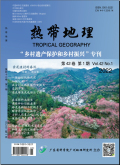热带地理2024,Vol.44Issue(8):1410-1422,13.DOI:10.13284/j.cnki.rddl.20230885
迈向第三空间:城市更新中遗产社区的情感流变与异质性认同
Toward the Third Space:Emotional Dynamics and Heterogeneous Identities in Heritage Communities during Urban Renewal
摘要
Abstract
This research delved into the complex dynamics of heritage communities during urban renewal,navigating the tension between preserving local heritage and embracing modernization.This study centered on Hangzhou's Mantoushan community and utilized a combination of fieldwork,participatory observation,semi-structured interviews,and online text analysis to investigate the interplay between spatial transformation and the construction of local identity in the context of urban development.This study aimed to dissect the multifaceted effects of urban renewal on the physical and emotional fabric of heritage spaces,with a particular focus on the microhistorical perspective.The methodology involved a comprehensive approach,capturing the voices of residents,tracking changes in spatial usage,and analyzing digital narratives to provide a nuanced understanding of the community's evolution.The results of this study underscore the dual impact of urban renewal.On one hand,it has led to improvements in the built environment and public amenities,fostering a renewed sense of community pride and attachment among residents.On the other hand,the process has been instrumental in the creation of a second space,as envisioned by authoritative bodies,which in turn,has given rise to a third space characterized by commercial,productive,and recreational functions.This transformation has been marked by diverse actors'reconstruction of the third space influenced by their varied perceptions and aspirations,which has led to a sense of dislocation and internal community division.The conclusions drawn from this study highlight the importance of recognizing the uneven and unstable nature of the transition towards a third space.It advocates for a more inclusive approach to urban renewal that acknowledges and addresses the diverse needs and aspirations of community members.This study also emphasizes the critical role of emotional connections and empathy in the sustainable development of heritage communities,cautioning against the illusion of a second space that overlooks the complex realities of community life.This study provides a compelling argument for a more nuanced understanding of the impacts of urban renewal on heritage communities.It calls for a balanced approach that respects the historical significance of these spaces,while embracing the potential for modernization,ensuring that the process of renewal is one that enhances rather than erodes the communities'sense of identity and belonging.The insights gained from this study are not only relevant to the Mantoushan community,but also offer valuable lessons for urban planners and policymakers worldwide,as they grapple with the challenges of integrating heritage conservation with the demands of contemporary urban life.关键词
遗产社区/第三空间/城市更新/遗产呈现/情感认同/杭州馒头山社区Key words
heritage communities/third space/urban renewal/heritage presentation/emotional identity/Hangzhou's Mantoushan community分类
社会科学引用本文复制引用
杨程程..迈向第三空间:城市更新中遗产社区的情感流变与异质性认同[J].热带地理,2024,44(8):1410-1422,13.基金项目
"浙江大学2023年双一流-一流骨干基础学科建设支持计划-社会学-研究生学术资助"项目(126800*194212301) (126800*194212301)

